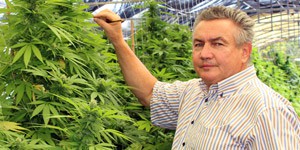By Guillermo Moreno-Sanz

Dr. Moreno-Sanz has authored more than 30 scientific articles and 3 patents describing the role of the endocannabinoid system in pain perception. Graduated in Biochemistry and Organic Chemistry from the University of Zaragoza, he obtained his PhD in Neuroscience from the Complutense University of Madrid, in Spain. He gained extensive international experience with long-term fellowships in the Netherlands, Italy, and the United States, developing most of his academic career at the University of California, Irvine, where he discovered a new class of cannabinoid analgesic with high clinical potential. In 2017, he acted as a consultant to the National Academies of Sciences of the United States in the preparation of the report "The health effects of cannabis and cannabinoids" and later founded Abagune Research to offer scientific advice and R&D solutions to the international cannabis industry. In 2020 he assumes the scientific and medical direction of Khiron Life Sciences in Europe.
Meet the Experts is a series of interviews conducted by experts from the field of Cannabis to world leaders in research and clinical practice of Cannabis as medicine.

Maria Fernanda Arboleda is a physician and surgeon by the Pontificia Universidad Javeriana, Bogotá, andan anesthesiologist and specialist in pain medicine and palliative care by the National Autonomous University of Mexico, UNAM. She is currently the Associate Research Director at Santé Cannabis and has an extensive experience in the responsible and safe prescription of medical cannabis in different clinical contexts.
Additionally, she has been a speaker and an international lecturer in more than 50 academic events, contributing and participating in the education of more than 5000 health professionals in Latin America, Canada, and the United Kingdom, among other countries. She has also participated in multiple international forums and panels on medical cannabis for patients and their families.
Guillermo Moreno-Sanz: Hello MaFer, tell us a bit about how did you start using cannabis in your practice?
María Fernanda Arboleda: Those of us who are dedicated to chronic pain management are in a continuous search for pharmacological and non-pharmacological tools that can help not only with pain control, but also with other associated symptoms that afflict these patients, such as anxiety, insomnia, and depression. This is how I decided to move to Canada for a clinical fellowship at the Montreal General Hospital and McGill University to deepen my knowledge on interventional pain management. There I had the first opportunity to see patients with advanced cancer who were prescribed cannabinoid-based treatments as a complement to their traditional therapies. It was love at first sight, as I observed an evident improvement in the quality of life of the patients and their families with this treatment. From that moment on, I decided to dedicate myself to learn and do everything I could to offer this treatment in a responsible and safe way, and I started graduate studies in medical cannabis and cancer continuous care with the department of oncology at McGill University and Santé Cannabis, a clinic specialized in medical cannabis in the province of Quebec.
GMS: The concept of a cannabis clinic may come as a surprise to some readers. What is the model for this clinic?
MFA: Santé Cannabis is an independent health institution that does not belong to any cannabis company and does not market any product. To date, more than 10,000 patients have been treated thanks to the development of our own clinical protocols to standardize the treatment with medical cannabis. In addition to medical consultation for the prescription of cannabinoids as a complementary therapy to traditional treatments, Santé Cannabis offers training for health professionals and resources that support the education of patients and their families, through workshops and courses, to involve them as an active part of the treatment with medical cannabis.
By having a unique care model and database, as well as research protocols approved by the Canadian Ministry of Health and external ethics committees, the clinic has become a sort of clinical research organization for medical cannabis, collaborating with public and private institutions and companies to conduct controlled clinical trials and observational studies to understand the reality of what happens with the long-term administration of cannabinoids in different medical conditions.
GMS: How has your clinical practice changed since you incorporated cannabis derivatives?
MFA: Currently, I am in private medical practice, primarily treating patients with chronic pain, as well as those requiring palliative care. I attend people in Colombia, Mexico, and Canada through virtual consultation. In Colombia, I had the opportunity to incorporate cannabinoids to conventional medical treatment, which allowed me to have a very useful tool for the control of symptoms associated with chronic pain and advanced diseases such as cancer. It is important to keep in mind that medical cannabis is not the first line of treatment, it does not replace other therapies, and it is not for everyone, as there are indications and contraindications, as well as possible interactions with other medications. Therefore, it is key to have the support and supervision of a physician who is properly trained in the prescription of cannabinoids.
GMS: Were you concerned about how your position on cannabis might affect your career as a physician?
MFA: Because I had the opportunity to delve into the subject starting from the scientific evidence and then finding the possible therapeutic effects of cannabinoids in clinical practice, I did not have any concerns related to my medical practice. On the contrary, it encouraged me to continue researching its uses and to share my knowledge and clinical experience with other health professionals in Latin America, Canada, and the United Kingdom, among other countries.
GMS: Have you been affected by the stigma associated with cannabis?
MFA: I think all of us who live in this prohibitionist era of cannabis face this social stigma globally. In my experience, I believe that the misinformation that exists related to cannabinoid-based treatments and the confusion between medicinal and non-medicinal (or recreational) use of cannabis have been partially responsible for so much prejudice and misconception. In the case of Canada, through my practice in the province of Quebec, one of the most conservative in the country, I learnt that there is a strong rejection and irrational fear associated with the use of cannabis for medicinal purposes. Despite advances in clinical research, there is still significant disapproval of cannabinoid-based treatments by medical associations and health professionals who still question the lack of clinical evidence supporting their therapeutic benefits, as well as limited knowledge related to the prescription of cannabinoids by the medical community.
GMS: Do you think this stigma is stronger in Latin America than in other regions such as North America or Europe?
MFA: In Latin American countries such as Colombia, Peru and Argentina I have found much more openness from health professionals, medical associations, and universities, which have decided to embrace the discussion and include topics related to medical cannabis in academic congresses and in medical cannabis courses and diplomas. I have had the opportunity to participate in the training of more than 5000 health professionals in Latin America, and I see that there is a strong desire to learn about the possible therapeutic uses of cannabinoids, as more and more patients come to the doctor's office seeking guidance and support from medical staff. Here it is key to recognize that what is being taught is not to prescribe cannabinoids indiscriminately, but to provide all the tools that allow the physician to offer an informed recommendation to their patients regarding medical cannabis.
GMS: The Spanish Congress has approved the formation of a subcommittee to study different international models of medical cannabis regulation and the quality of the existing evidence. You are Colombian, trained in Canada now living in Mexico. These are three crucial countries in the medical cannabis regulatory movement. What do you think are the best and worst aspects of each of these models of medical cannabis regulations?
MFA: The regulation of cannabis for medicinal purposes in Canada began in 2001, which promoted safe access to cannabinoid-based treatments with products that comply with quality standards and sanitary support from the Canadian Ministry. However, despite having approximately 400,000 patients registered in the national medical cannabis program, there are still major limitations. Medical cannabis continues to be a treatment not approved by medical associations at the national level, and high taxes together with the lack of coverage by most insurance companies also condition and hinder the access to cannabis products for medical purposes, which means that more than 70% of patients continue to access products from illegal markets and administer them without medical supervision.
Colombia, on the other hand, has been a pioneer in regulatory matters, with countries such as Argentina and Peru opening to the issue little by little. In fact, the Colombian regulatory framework has been a model for other countries in the region since 2016, when the use of cannabis for medicinal purposes was authorized, and then in 2020, when its commercialization began through a legal route with strict licenses for the proper manufacturing of cannabinoid-based products with pharmaceutical grade and guarantee of patient safety. However, rigorous, and good-quality clinical research is still required to show the therapeutic effects of cannabinoids in the local or Latin American population. In addition, costs and lack of insurance coverage continue to limit the access and availability of cannabinoid-based products through legal means.
In the case of Mexico, despite the reforms made to the General Health Law (LGS) in 2017 and the publication of the regulation on sanitary control for the production, research and medicinal use of cannabis and its pharmacological derivatives in January 2021, there are still legal gaps that prevent the availability of safe cannabinoid-based treatments that can guarantee patient safety. This is frustrating, as we physicians are completely limited to offer this therapeutic tool in a responsible and safe way.
GMS: You have embarked on a personal project through which you offer all your experience and knowledge with the therapeutic use of cannabis. I am struck by your focus on palliative care and accompanying patients in a terminal phase. What do you think cannabis can offer to people facing the end of their lives?
MFA: Definitely, the use of cannabinoids in the palliative patient is one of the topics I am most passionate about. First, it is essential to remember that the palliative patient is one who has a disease that has no cure with a very short life prognosis, usually less than six months. The objective of this care is to provide well-being and comfort to the patient, as well as to family members and/or caregivers. Therefore, the goal is to offer quality of death, prevent and alleviate suffering through early identification, evaluation and correct treatment of pain and other symptoms, be they physical, psychosocial, or spiritual.
I had the opportunity to see hundreds of patients in advanced stages of their disease who presented multiple symptoms (caused by the disease itself or by treatments such as chemotherapy, radiotherapy, surgery, etc.), which cannot be controlled with traditional therapies, and where cannabinoids can play an important role in complementing conventional management. Something critical is to recognize cannabinoids as a useful tool that does not seek to replace other therapies, and therefore it is necessary to manage the expectations of the patient and / or his family, as medical cannabis has not been shown to cure any disease, nor is it the panacea or miracle drug that will save the patient from all the problems he is facing at the end of life.
Thank you very much MaFer for sharing your experience with us!


